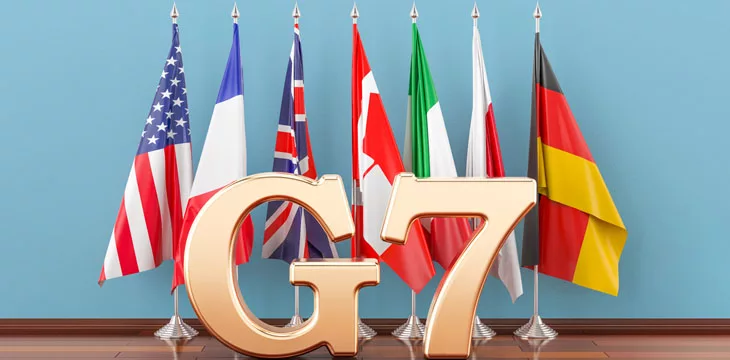
|
Getting your Trinity Audio player ready... |
Italy has designated artificial intelligence (AI) regulation as a key focus for its tenure as head of the Group of Seven (G7) nations, hinting at supporting the establishment of stricter developer rules.
Italian Prime Minister Giorgia Meloni confirmed the country’s plans toward AI, which are targeted at making regulations match the pace of industry-wide innovation. Italy will lead the G7 for the next 12 months and is expected to push for a concerted regulatory effort between member countries rather than a staccato approach.
G7 member nations include the United States, Canada, France, Italy, Britain, Germany, and Japan, playing host to advanced AI developers. Leading AI firms, including OpenAI and Google (NASDAQ: GOOGL), are domiciled in G7 nations, but Italy’s exact blueprint for greater regulatory control remains unknown.
However, industry experts are bracing for a focus on rule-making that may affect the use of AI in the workplace across the European Union (EU), with employee job security at the top of the pyramid.
“I am hugely concerned about the impact of AI on the labor market,” said Meloni. “Today we are faced with a revolution where human intellect is in danger of being replaced.”
Italy’s first salvo will be to convene an AI-focused session for stakeholders ahead of the leaders’ summit in Q2 2024. Representatives of leading AI firms are expected to participate in the sessions, with experts noting that the resolutions reached may form the foundation for rules to be ironed out by developing nations.
While Italy is subject to the incoming EU’s AI Act, there are fears that the new G7 leader may adopt an even harsher stance toward AI during its tenure. The country has previously endured a tumultuous relationship with AI, famously geo-restricting ChatGPT for breaching national and regional data privacy rules.
After intense horsetrading, Italy lifted its ban on ChatGPT but ramped up its investment to protect consumers from illegal data scraping by the AI developer. Investigations into OpenAI’s customer data handling are still underway in what Italian authorities describe as a “fact-finding” mission.
Apart from AI, Italy will place the war in Ukraine and African development at the top of its priorities for its tenure as G7 President.
A global effort at regulation
Rather than develop AI regulations in silos, countries are tilting toward a concerted approach to establish regulatory standards for emerging technologies. The EU is leading the charge with its attempt at crafting a regulatory rulebook for the region, with the U.K. reaching a historic milestone with 28 countries signing the Bletchley Declaration.
“We encourage all relevant actors to provide context-appropriate transparency and accountability on their plans to measure, monitor, and mitigate potentially harmful capabilities and the associated effects that may emerge,” read the document.
The United Nations (UN) has previously pointed to AI threats in mid-2023, rolling out a new advisory body to leverage the technology for good in a preemptive move.
In order for artificial intelligence (AI) to work right within the law and thrive in the face of growing challenges, it needs to integrate an enterprise blockchain system that ensures data input quality and ownership—allowing it to keep data safe while also guaranteeing the immutability of data. Check out CoinGeek’s coverage on this emerging tech to learn more why Enterprise blockchain will be the backbone of AI.
Watch: Blockchain, AI & Web3 at B2029 Meetup in Berlin
Recommended for you
Lorem ipsum odor amet, consectetuer adipiscing elit. Elit torquent maximus natoque viverra cursus maximus felis. Auctor commodo aliquet himenaeos fermentum
Lorem ipsum odor amet, consectetuer adipiscing elit. Accumsan mi at at semper libero pretium justo. Dictum parturient conubia turpis interdum

 11-22-2024
11-22-2024


